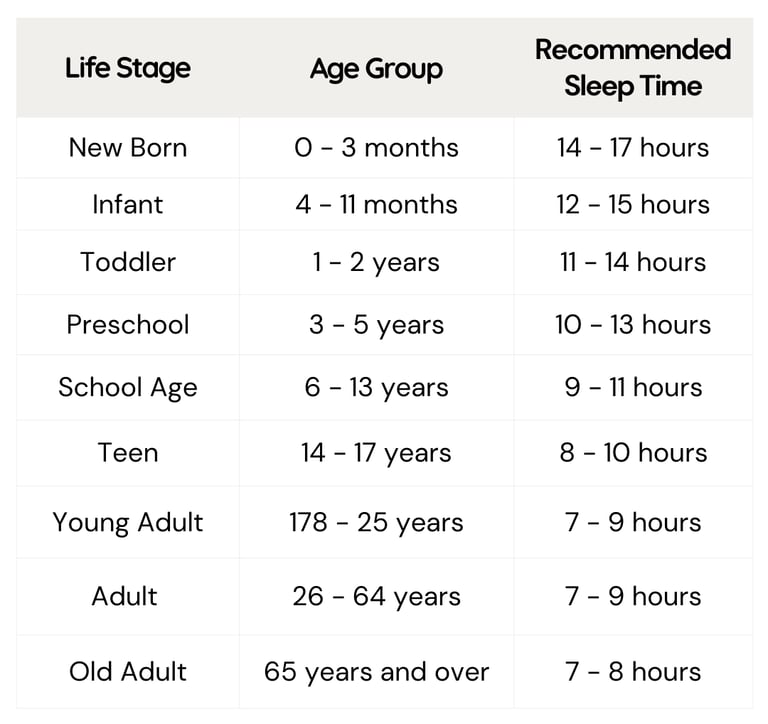How Much Sleep Does a Person Need to Be Healthy?
We’ve all heard a lot about the importance of sleep. But how much sleep does a person really need? Read on as we discuss the sleep needs of different people.
SLEEP HEALTH AND WELLNESS

Photo Credit: blackCAT
Most people know the importance of getting enough sleep to stay healthy. But many do not know that sleeping too much is equally (if not more) bad. Just as sleeping too little can cause health problems, oversleeping may put you at a higher risk of various diseases. Therefore, it’s important to find the right balance and sleep just as much as your body needs to stay healthy. But how much is that? This is exactly what we are going to discuss today. So let’s get to it, shall we?
How Much Sleep Does a Person Need?
The amount of sleep a person needs depends on two key factors:
Genetics
Genetics plays a dual role in the human sleep cycle. It contributes to determining the amount of sleep a person needs and plays a vital role in setting up their circadian rhythm (sleep-wake cycle). Whether you prefer going to bed early or staying up till late depends on your genetics. Similarly, some people are early risers because they are genetically inclined to be morning persons. This is not to say that genetics is the only factor responsible for determining your sleep schedule. Lifestyle factors and habits also play an important role in it. This means you may alter your sleep-wake cycle by changing your lifestyle and adopting healthy sleep habits.
Age
Our need for sleep as well as our sleeping pattern, continues to change as we grow older. Children need more sleep than adults because they are still growing and need those extra shut-eye hours for healthy physical and mental development. Older adults, on the other hand, tend to sleep less because of age-related changes in the suprachiasmatic nucleus (SCN) that controls the circadian rhythm. The diminishing exposure to daylight with increasing age also impacts the sleep cycle. Aging also reduces the amount of melatonin the body produces, leading to lesser sleep.
Other Factors That Contribute to Determining Your Sleep Requirements
While genetics and age are the two primary factors that determine a person’s sleep needs, the following also play a role:
Gender
The general sleep recommendations are the same for both men and women. However, research shows that women need a little more sleep than men.
The reasons being are:
✔ Their circadian rhythm is slightly shorter than men
✔ They use their prefrontal cortex more frequently (in multitasking)
In terms of time; the research estimates that women, on average, require 20 minutes more sleep than men.
Your Health May Also Influence Sleep
Your health also often plays a role in determining your sleep needs. Certain health conditions may require you to get more rest. Moreover, various medications may also make you drowsy, requiring you to sleep for more hours than a healthy individual.cle. Aging also reduces the amount of melatonin the body produces, leading to lesser sleep.
How Long Should You Sleep at Night?
Considering you can’t change a person’s genes and lifestyle factors tend to vary significantly, healthcare experts have made age their primary criteria for determining the need for sleep for individuals at different stages of life.
Recommended Hours of Sleep by Age


It’s important to note that even though older people tend to sleep less due to various physiological, psychological, or environmental (external) factors, their sleep requirement remains almost the same as it was in the young adult phase.
How Long Do People Actually Sleep?
But just because you’re able to function on six hours of sleep doesn’t mean you should. The CDC stated that 1 in 3 American adults do not get enough sleep.
Dr. Chrsitopher P. Landrigan, Director of the Sleep and Patient Safety Program at Brigham and Women’s Hospital, says, “many people routinely get six hours of sleep every night, but only a few of them can perform well with that little sleep.”
Researchers from the University of California have also confirmed this that the gene (mutation) that enables some people to maintain optimal functioning at six hours of sleep is found in less than 3% of the population. The remaining 97% can’t function well on six hours of night sleep. The same group of sleep researchers also found another gene mutation that promotes short sleep naturally and makes people feel fully rested and fresh with as little as four hours of sleep. However, that is also very rare.
What Happens When You Don’t Sleep Enough?
You may not feel any impact immediately. But when you consistently sleep less than your body needs, you face a high risk for several health conditions, including but not limited to obesity, hypertension, diabetes, and even heart disease. Persistent sleep deprivation also triggers inflammation, increasing your risk for health issues. Insufficient sleep can also raise the levels of cortisol (stress hormone) in the body. Not getting enough z’s on a regular basis also affects your mood and mental well-being, as well as your emotional balance and productivity. It also negatively affects your immune function, further raising your risk of catching diseases. The quantity and quality of your night’s sleep are also linked to your appetite.
When you’re sleep deprived, your body seems to produce more hunger hormones, making you more likely to overeat. If this continues to happen regularly (or even frequently), you’ll begin to put on weight, which then can put you at risk for several other health problems.
Some of the common side effects of sleep deprivation include:
Lack of energy
Reduced motivation
Trouble concentrating
Memory issues
Impaired decision-making
Reduced productivity
Bad mood
Irritability
Difficulty managing emotions
Anxiety
Higher risk of depression
Reduced sex drive
All in all, consistent sleep deprivation can lead to impaired physical and mental performance and psychological well-being. In the long term, it can lead to several diseases and behavioral issues.
Why Do We Need So Much Sleep?
Research tells us that the average person spends about one-third of their life sleeping or trying to sleep. This may make some people wonder why we need so much sleep, and cutting on their sleep time may help them be more productive, as they’ll have more time to do things. However, science has confirmed that it doesn’t work like that. Skimping on sleep not just reduces productivity; it also paves the way for several more negative health effects. Wondering why is that so?
Here’s the answer: To many of us, sleep is just the time when we rest our bodies to overcome fatigue and replenish energy. But it’s actually a lot more than that. While you’re getting the shut-eye, the body undergoes extensive self-repair and maintenance needed to keep it working in top condition. Regularly compromising on sleep for a considerable period of time can even set you up for a major physical and mental breakdown.
Conclusion